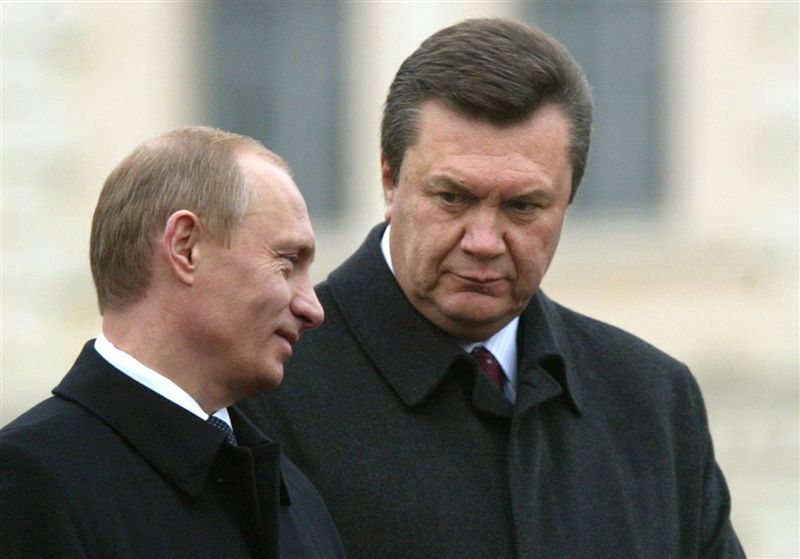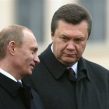
Ukraine: Survival of the Steadiest
Publication: Eurasia Daily Monitor Volume: 11 Issue: 13
By:

The decision of Viktor Yanukovych’s government in Ukraine to suspend its Association Agreement with the European Union last November was perceived by many as a geopolitical victory for Russia and a defeat for the EU (see EDM, December 3, 4, 2013; January 8, 2014). However, considering that any process of regional integration is a social phenomenon, it is also a reversible one.
What lessons can be gleaned from Ukraine’s dramatic foreign policy turn-around? The interests of political elites are important in explaining a country’s foreign policy choices. Yet, even at present, there is still insufficient understanding about what pushed President Yanukovych to call off Ukraine’s association with the EU. Knowing this is critical, as the EU’s perception of the incentives and interests that guided the Ukrainian elites is going to shape its policy toward Ukraine, Russia and even other Eastern Partnership countries.
A frequently cited reason behind Ukrainian’s turn-around is the daunting pressure of the Russian economic sanctions (RIA Novosti, November 27, 2013). Another one is the highest bidder story, which portrays Yanukovych as the short-sighted auctioneer that collected bids from both the EU and Russia (Kyiv Post, November 29, 2013). Both explanations, however, are built on a weak foundation in terms of both logic and evidence.
Research on economic sanctions suggests that they are rarely successful. Gary Hufbauer, a senior fellow at the Peterson Institute for International Economics, and his co-authors concluded in one of the most optimistic assessment of sanctions that they are successful in only some 30 percent of cases. It helps to also know that sanctions have a higher chance to lead to their target’s concession when they affect low-salience issues and the perceived alternatives are more costly (Gary Clyde Hufbauer et al., Economic Sanctions Reconsidered, November 2007).
Integrating closer with the EU would have actually helped Ukraine to better cope with Russian economic pressure, at least in the longer term, which is why the sanctions explanation seems insufficient. Nonetheless, it was presented by the Ukrainian leadership as a plausible and benign-sounding justification to obscure its real motives behind the rejection of the EU Association Agreement.
Both the sanctions and the auctioneer stories ignore the strategic interests of the incumbent government in Ukraine, which is to retain power. Were Ukraine to move closer to the European Union, its economic and financial dependence on Europe and the West, more generally, would gradually increase. As a lateral consequence, the current leadership would be more exposed to scrutiny and become politically more vulnerable. It would also find it more difficult to use administrative resources, like selective justice or distributing social benefits before elections, to increase its electoral advantage.
Another source of weakness for the team currently ruling the country is transitions of power. In Ukraine, political leadership changes trigger the redistribution of lucrative businesses (opendemocracy.net, January 29, 2013). Furthermore, this administration incarcerated the president’s key political opponent, former prime minister Yulia Tymoshenko—exacerbating the implications a future electoral loss would have for Yanukovych by setting a precedent of jailing one’s opponents upon victory.
If, and when the opposition comes back to power, it will also want to redistribute the control over businesses. In the process of doing so, it will likely also attempt to confine members of the previous administration in prison. Consequently, were Yanukovych to fulfill all of the EU’s political conditions related to the Association Agreement before outright winning the next round of elections, he would have little chance to stay another term in office after 2015. High-positioned people in his government face a similar uncertainty about their fate if the next elections are lost.
This domestic political dynamic helps explain why the Yanukovych administration accepted the Russian option, which it had been resisting since coming into office. Unlike the EU choice, the rapprochement with Russia is less threatening to the current government’s hold on political power. And in fact, Russia is offering political assistance in the form of cash that President Vladimir Putin publicly described as “brotherly help” with no strings attached (RBCdaily.ru, December 19, 2013). Even though that cash will not last for long (Kommersant.ua, December 25, 2013), it appears to be sufficient to help Yanukovych contain Ukraine’s economic and social problems up until the presidential elections next year (see EDM, January 8).
Furthermore, Russia is also offering to provide Ukraine with diplomatic protection against international pressure. Its officials have repeatedly condemned Western support for the anti-government protests, qualifying them as interference in Ukraine’s internal affairs and attempts to forcefully change the elected government (see EDM, December 5, 2013; RBCdaily.ru, December 2, 2103; Kommersant.ru, December 17, 2013).
In fact, the Ukrainian Zerkalo Nedeli newspaper wrote, quoting its sources in Moscow, that during the Yanukovych-Putin negotiations the latter promised the former help in obtaining international legitimization after the 2015 elections (ZN.ua, November 16, 2013). If President Yanukovych wishes to stay in office at any price, the partnership with Russia is much more attractive to him than one with Europe. The West did little to prevent the dim fates of authoritarian leaders that used to do business with Europe and the United States, but were later toppled—of which Egypt’s Hosni Mubarak is a recent example. Putin, instead, could rightfully claim that Russia has been working hard to keep its allies in power. This now includes Syria’s political leadership (see EDM, May 30, September 19, 2013), in addition to the long-standing tradition of insulating the governments of Central Asia from the Western pressure (see EDM, October 16, 2013; The Diplomat, September 2, 2013).
Meanwhile, the Ukrainian government is apparently copying the strategies the Russian government developed for dealing with popular protests (see EDM, January 17). It tries to defuse the protests by waiting them out, creates anti-protest movements to claim its policies have support (Zn.ua, January 13), and exploits Russian financial assistance to buy out segments of the population with increased social benefits (Kommersant.ru, December 19, 2013). Yanukovych has also just signed a set of draconian bills that prevent “unsanctioned” protests, restrict Internet use for protest mobilization, and undermine non-governmental organizations in a similar way to Russia’s controversial legislation (Kommersant.ua, January 17).
Increasing social benefits a year ahead of the next elections should help Yanukovych beat the fragmented opposition (Rosbalt.ru, January 9) and win over the economically struggling population. Given the already somewhat even split among the Ukrainian electorate over the protests—50 percent supporting them, and 42 percent against (Zn.ua, December 27, 2013)—the incumbent government is now in a relatively good position to attract the necessary votes.




